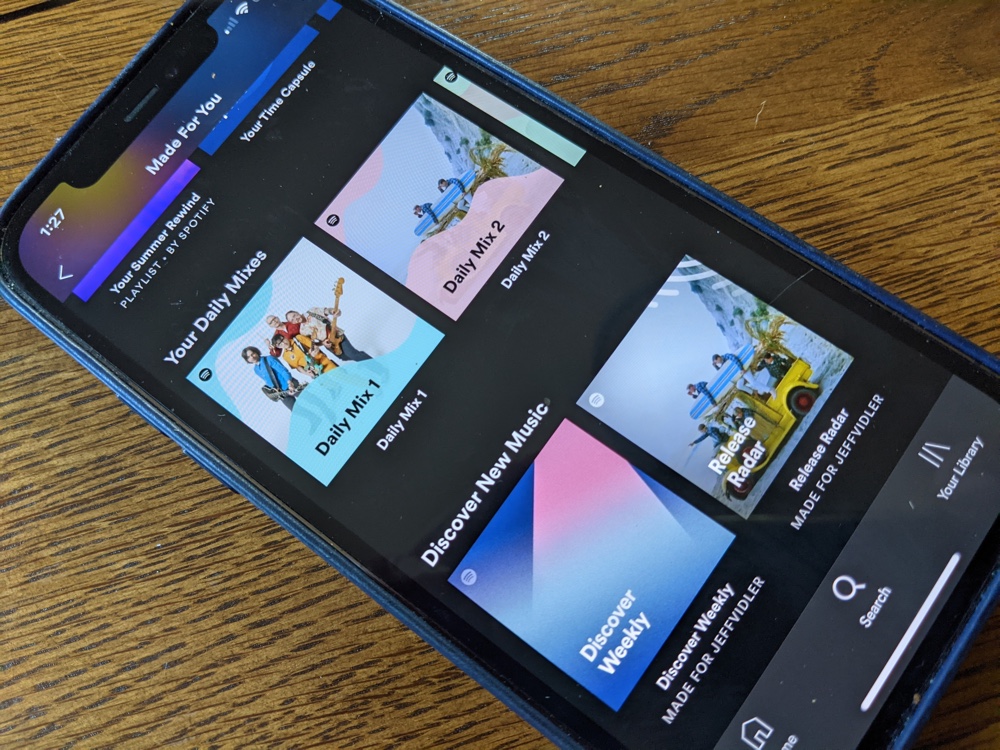I have an interesting relationship with Spotify… and it’s complicated.
As someone who specializes in audio research, I’m fascinated by Spotify’s focus on data. With 365 million users, Spotify has a massive amount of data on music and podcast listening. And they use it in so many ways.
As a Spotify listener, I like checking out their algorithms as they try to personalize my listening experience. Every Saturday morning, I pour a cup of coffee and pop open my Discover Weekly playlist to see what Spotify has dug up for my listening pleasure.
Sometimes, they hit a home run. Spotify will find that lost classic I had forgotten—or a new artist who becomes an instant favourite. But other times, it’s a big swing and miss: lame cover versions, or week-after-week repeats of tracks they’d already recommended.
The strange thing is that the more I use Spotify, the more often it seems their algorithms miss the mark. Maybe I’m just a tough customer to figure out. My musical whims take me from singer-songwriters to jazz vocals to Top 40 pop divas. Or maybe it’s their controversial new Discovery Mode offer to artists: they’re asking artists to lower their royalty rates on the songs they want subscribers to hear, and Spotify will help listeners ‘discover’ those tracks. (Somewhere, Alan Freed is spinning in his grave.)
Looking more broadly at my data relationship with Spotify though, I do love that they often share insights that help to move the industry forward.
Spotify’s latest data-driven analysis lays out some building blocks behind engaging podcasts. They analyzed descriptions and transcripts from some 5,000 podcast episodes looking for characteristics that correlate with high listener engagement. (Engagement was based on whether first-time listeners to the podcast stayed with the episode for at least five minutes.)
Among the key takeaways, high engagement podcasts are more likely to use:
- Positive language
- Less swearing with fewer interjections (e.g., “oh,” “right,” “cool”)
- A diverse vocabulary, but within the range of mainstream speech
- A crisp pace of delivery
- A sense of suspense
Spotify’s analysis also underscores the importance of making audio content personal. Maybe the most striking finding from their research is that highly engaging podcasts included more first person and second person pronouns (e.g., me, you, we, my, your, our) and fewer third person pronouns (e.g., he, she, they, his, her, him, it).
That fits in neatly with what budding radio announcers have long been taught—most radio listeners listen by themselves, so they should talk to one person, never the crowd. Podcast listening is an even more solitary activity: In our Canadian Podcast Listener studies, the average listener tells us that, up to 90% of the time, they listen to podcasts on their own.
What does that mean to podcasts? Personal stories and personal testimony are extra powerful. And to radio? Putting listeners on-the-air to tell their own stories make a stronger connection than having someone else tell the stories on their behalf.
If you’re looking for an example of power of audio as a personal medium, consider how The Beatles first exploded on the scene in the early 60s. Sure, they had incredible talent and great songs. But, at a time when so many radio hits were written in the third person, The Beatles made a calculated effort to write songs that reached out to their fans personally. As Paul McCartney says:
"Our original songs were all very personal and they all had a personal pronoun in them; ‘Love Me Do’, ‘P.S. I Love You’, ‘From Me to You’, ‘She Loves You’. We were directly trying to communicate with the people who liked us.”
Paul McCartney Tweet
Make your audio content personal—the potential payoff is clear. Who knows? You might even make a deeper personal connection than that Spotify algorithm.
Signal Hill Insights are audio research consultants specializing in custom research solutions for publishers, broadcasters and advertisers. If you’d like to know more about our Brand Lift Studies or how our other research, connect with us at https://signalhillinsights.com/
